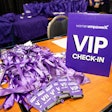Every year, we participate in client roundtables, quarterly business reviews and industry events. And every year we hear a common question among many SMM leaders: Why has adoption or engagement to meetings management policies been historically low, and how can we shift this?
There are many possible reasons why a meetings management policy is not being readily adopted. The most common arguments include:
Ben Hoeksma is an account director and Laura Konwinski is senior director of global compliance at BCD Meetings & Events.
- a lack of understanding as to why it is being brought in
- stakeholders who don’t feel it is tailored to them
- stakeholders who believe their events are too special to be included in the policy
- meeting owners who have too many other obligations to dedicate enough time to understanding the benefits of a managed program.
- Stakeholder engagement. Meetings Management leaders must be visible! Don’t hide behind a desk or emails telling people what they should be doing. Get out and talk to people who this will impact, experience the program (including going on-site at key events), feel their pain, understand their frustrations and use these as a way to improve your program and to sell in the benefits of the SMMP. Make sure you listen— we’ve seen program fail when the input received was ignored by the owner and the stakeholders feel isolated and fight against change from within. Don’t make that mistake.
- Understand your corporate culture. It’s no surprise that the gold standard in meetings management policies is a singular global mandate to follow a managed process. However, that simply isn’t feasible for all organizations. You must understand your own company and how to get things done. Are mandates viable? For some organizations, the answer is no. For multinationals, can you adopt a singular-global policy without local nuance? Knowing the answer to questions like these will help you anticipate roadblocks and find alternative solutions.
- Get executive buy-in. Show senior leaders exactly how your program supports them. This invariably comes down to risk mitigation and financials. Once they have bought it, use them as a way to cascade what is coming to the organization.
- Build a coalition of advocates. After you have begun to meet your stakeholders and listen to their needs, ask them to join your cause. Your coalition of supporters can organically help you grow adoption with their own good will.
- Have a singular message. Don’t bury a new program among other new initiatives, changes in travel policy, etc. This should be a standalone launch that is afforded its time in the sun. You should be confident enough in the benefits that it stands up to scrutiny.
- Create a marketing campaign. Consider a “Meetings Engagement” campaign that makes understanding the policy easy. Try including multiple mediums featuring quick and easy videos, infographics and interactive PDF policies.
- Be willing to adapt a degree depending on individual stakeholder and country/cultural needs. Being rigid in your approach can be alienating. As long as the end result is the same, allow for some nuance.
- Sell all the benefits. Managed Meetings programs are not solely about cost savings. Ensure that everyone understands the other major benefits the business will achieve from the program. Tie in the goals of program to your company goals so that it’s easier for people to associate success with something familiar and tangible.
- Shout about success. Don’t be afraid to be vocal and visible with successes early or often. This will encourage others to buy in.
- Face non-compliance head on. Don’t let policy violations slide. Address violations and discuss why they did not follow policy, provide guidance and discuss ramifications for repeat violations.
- Solicit ongoing feedback. Set up a panel of key stakeholders and ask them tough questions about your program. Be willing to listen to their concerns and suggestions. Ask them to be a soundboard for future program enhancements.
Ben Hoeksma is an account director and Laura Konwinski is senior director of global compliance at BCD Meetings & Events.















